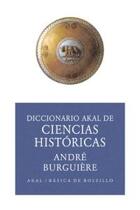
Today every historian is aware that the object of his discipline is not the past in itself, but what, in the traces that the past leaves us, can still answer the questions that we ask ourselves today. What is assigned to history is not, then, “resurrection” –the one that Michelet dreamed of-, but rather a task of understanding. In order to meet the most recent demands of the historian, the dictionary adheres closely to what establishes its character as a scientific product: 1. The methods (such as computer processing, quantitative history, oral history, prosopography, etc.). 2. The concepts (anachronism, crisis, decadence, collective memory, etc.). 3. 4. The areas (historical demography, economic history, military history, etc.). 5. Objects (food, education, international relations, etc.). 6. The historical questions and the historians who have contributed the most to the development ...read more












